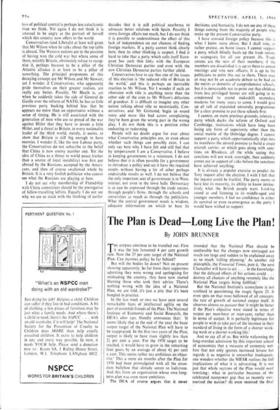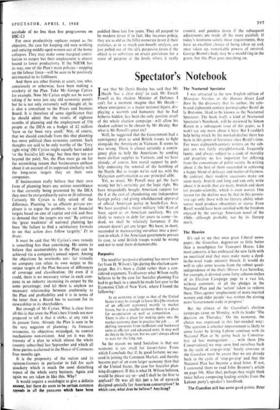The Plan is Dead—Long Live the Plan!
By JOHN BRUNNER
THE corpses continue to be trundled out. First it was the late lamented 4 per cent growth rate. Now the 25 per cent target of the National Plan. Can incomes policy be far behind?
But will the bodies lie down? Not on present showing apparently. So far from their supporters admitting they were wrong and apologising for misleading the country, they have now started blaming those who took their advice. There's nothing wrong with the idea of a National Plan, we are told, it's just a pity that it's been bungled in practice.
In the last week or two we have seen several remarkable feats of intellectual agility on the part of erstwhile friends of the Plan. The National Institute of Economic and Social Research, the DEA's alter ego, blandly announces that: 'It seems likely that at the end of the year the basic output target of the National Plan will have to be reappraised. In the first two years of the Plan, output is likely to have risen slightly less than 21 per cent a year. For the 1970 target to be reached, it would have to grow in the remaining four years by an average of about 41 per cent a year. This seems rather too ambitious an objec- tive.' This a mere six months after the Plan for 1970 had been promulgated with all the atten- dant ballyhoo that already seems so ludicrous. And this from an organisation whose own long- term plan was even more ambitious.
The DEA of course argues that it never
intended that the National Plan should be unalterable but the changes now envisaged are much too large and sudden to be explained away as so much 'rolling planning.' As another old planophile, the Financial Times, puts it, 'the next Chancellor will have to act . . in the knowledge that the delayed effects of his actions could . . destroy all chances of anything remotely like the National Plan targets being fulfilled.'
But the National Institute's iconoclasm is not confined to questioning the magic figure 25. It even spits on that most hallowed of all concepts. the rate of growth of national output itself. It observes almost en passant that 'it might be better if the Plan's objective were stated in terms of output per man-hour or man-year, rather than in terms of output. It is perfectly legitimate for people to wish to take part of the increase in their standard of living in the form of a shorter work- ing week or a shorter working life.'
And so say all of us. But while welcoming the long-overdue admission by this important school of economists that a measure of economic wel- fare that not only ignores increased leisure but regards it as negative is somewhat inadequate. one wonders whether the NIESR realises the full implications of what it is advocating. It is not just that whole sections of the Plan would need `rewriting: what in particular becomes of the celebrated manpower gap that so recently mes- merised the nation? (It even received the final
accolade of no less than five programmes on BBC-2.) For once productivity replaces output as the objective, the case for keeping old men working and enticing middle-aged women out of the home collapses. They may make some marginal contri- bution to output but their employment is almost bound to lower productivity. If the NIESR has its way, one of the Plan's main policies—stepping up the labour force—will be seen to be positively detrimental to its fulfilment.
And there are other friends at court, too, who, consciously or otherwise, have been making a mockery of the Plan. Take Mr George Cyriax for example. Now Mr Cyriax might not be worth taking if he were just any old economic pundit but he is not only extremely well thought of; he is also a consultant to the Prices and Incomes Board. It is therefore of some significance that he should admit that the results of eighteen months of planning and the employment of 550 people at the DEA on a budget of £2 million `have so far beeti very small.' Not, of course, that we should conclude from this that planning has more political than economic content. Such thoughts are said to be only worthy of the 'Tory right wing' (Mr Cyriax might equally have added 'or the Socialist left wing,' but then they too are beyond the pale). No, the Plan must go on for the astonishing reason that businessmen enthuse about it on account of its supposed similarity with the long-term targets they set their own companies.
If businessmen really believe that their own form of planning bears any serious resemblance to that currently being promoted by the DEA they must be extraordinarily naive or ill-informed. Certainly Mr Cyriax is fully seized of the difference. Planning `to an efficient private em- ployer is to argue the problem, to set financial targets based on cost of capital and risk and then to demand that the targets are met.' By contrast the 'great weakness' of national planning has been 'the failure to find a satisfactory formula to see that action does follow targetry.' Et to Brute.
It must be said that Mr Cyriax's own remedy is something less than convincing. He seems to believe that accountability to the Plan can be achieved via a company's annual report. Among the objections he overlooks are: (a) virtually no company can relate its own output to the output targets of the Plan because of differences of coverage and classification; (b) even if it could, there is no necessary virtue in each com- pany in an industry increasing its output by the same percentage; and (c) there is anyhow no necessary relationship between conformity to the Plan and profitability and it is in terms of the latter than a Board has to account for its stewardship to its shareholders.
But enough of Mr Cyriax. What is clear from all this is that even the Plan's best friends are now prepared to tell it that it stinks, at any rate in its present form. Already the Plan is seen to be the very negation of planning : its forecasts erroneous, its objectives misjudged, its control mechanisms non-existent. And yet it was this travesty of a plan to which almost the whole country subscribed last September and which all three parties acclaimed in the House of Commons four months ago.
It is the propensity of the nation and its opinion-formers in particular to fall for such quackery which is much the most disturbing aspect of the whole sorry business. Again and again we are taken in like this. Why?
It would require a sociologist to give a definite answer, but there do seem to be certain common appeals in all the panaceas which have been peddled these last few years. They all purport to be modern (even if in fact, like incomes policy, they are as old as the hills) numerate (even if their statistics, as in so much cost-benefit analysis, are just pulled out of the air), purposive (even if the object is to substitute an ersatz patriotism for a sense of purpose at the levels where it really counts), and painless (even if the subsequent adjustments are made all the more painful). If today's nostrums satisfy these requirements, they have an excellent chance of being taken up and, once taken up. remarkable powers of survival. George Brown's body may be a-mould'ring in the grave, but this Plan goes marching on.



































 Previous page
Previous page